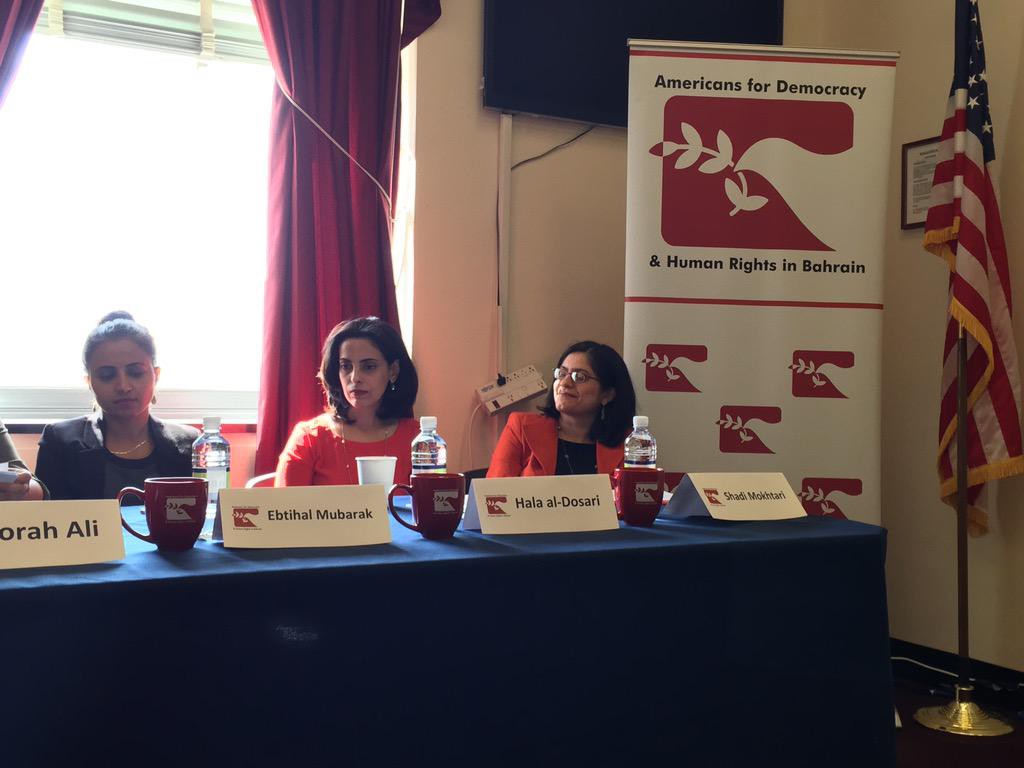On 13 May 2015, Americans for Democracy & Human Rights in Bahrain (ADHRB), in coordination with Human Rights First, hosted a panel entitled, “The Evasion of Equality: Discrimination against Women in Saudi Arabia.” The panel examined the evolution of gender equality and the rights of women in the Kingdom of Saudi Arabia, including analysis on the guardianship system. The panel was moderated by Norah Ali, ADHRB’s Saudi Advocacy Associate, and composed of Ebtihal Mubarak, a Brooklyn-based Saudi journalist, Dr. Hala al-Dosari, an activist and health researcher, and Dr. Shadi Mokhtari, a professor at American University.
Norah Ali, ADHRB’s Saudi Advocacy Associate, opened the panel by talking about ADHRB’s latest report The Evasion of Equality: A Report on the Implementation of Saudi Arabia’s Recommendations from the Special Rapporteur on Violence against Women and Its Causes. She stated, “The UN Special Rapporteur on Violence against Women visited the country in 2008, making a number of recommendations on subjects ranging from the elimination of violence against women to the women’s empowerment in the government and judiciary… While the government has made some progress, we have found that it has effectively ignored the vast majority of the recommendations.” She continued by detailing how women do not maintain any positions of authority in the government, citing that the only woman to ever hold a position in the Saudi cabinet was recently dismissed. “Women also remain unprotected from domestic violence and rape,” Ali continued. “If the government is ever to realize the rights of women in the country, it must fully recommit to their realization.”
Norah Ali continued by asking the panelists for their general thoughts on the status of women’s rights in Saudi Arabia. Dr. Hala al-Dosari answered first, stating that the government is not taking enough steps to eliminate the institutionalized guardianship system and the “enforced restriction” on women in the country. “However, the increased awareness will only benefit the situation of women in the country,” al-Dosari continued. Dr. Mokhtari addressed the question by stating that Saudi Arabia’s women suffer from some of the worst conditions in the Gulf and even in the world. “On the other hand, as civil society is slowly developing in Saudi Arabia, we’re starting to see the beginnings of serious activism from women in the country.” She went on to say that the government does significantly limit their activities, however, and seems to be making only superficial concessions while not treating the more significant and underlying issues. Ebtihal Mubarak stated that she sees no prospect for improvement for Saudi women at the moment. “The Saudi government has an official policy of discrimination against women,” she said, going on to say that the guardianship system provides an example “of a system that demands the complete obedience of women towards their guardians.” “Changes are going to be cosmetic,” she said, until the underlying governmental structure is fixed.
Norah Ali asked Mubarak to provide more analysis on the Wahhabi interpretation of Islam and how it contributes to impeding women’s rights. “The guardianship system is the biggest problem in Saudi Arabia,” said Mubarak, stating that the Saudis often stress that their cultural and religious differences mean that there will be differences in the implementation of human rights. “But no other major Muslim country has these problems for their women,” she said, stressing that Islam is not incompatible with women’s rights. Ali asked the panel to speak on women’s equality in Shariah law. Dr. Mokhtari addressed the question, stating that, “The Wahabbi school of Islam is very conservative.” She continued by explaining that, as other states in the region have reformed their own laws, their own secular women’s rights movements have pushed a more liberal approach.
Ali asked Dr. Hala al-Dosari about the importance of grassroots movements and freedom of speech in terms of women’s rights. “There are more and more people that are discussing issues of concern for Saudi people, including women’s rights,” she said. “Most women do not see a contradiction between being a Muslim and advocating for women’s rights.” She continued by stating that the government attacks dissent by making examples of those that would express themselves. “You’re not allowed to have a political association, a civil association, anything.”
Ali posed a question on whether or not the guardianship law affects a woman’s ability to report domestic violence. Dr. al-Dosari addressed the question, stating that, while there are laws in Saudi Arabia that provide for women to be allowed to report episodes of violence, but that these laws are not implemented and that the guardianship system often prevents women from utilizing them. When women do report violence, however, the system makes it difficult for women to provide documentation without the aid of their guardian. She continued by stating that women can’t go to the shelter because they would need to abandon their children, “a worse situation than whatever she’s accustomed to.”
At this point, Ali opened up the panel to questions from the audience, and a member asked about the hazards of Saudi traffic. “If we’re going to stop everything because of the hazards, then we wouldn’t be able to do anything,” said Dr. al-Dosari. A second audience member asked about what happens to women caught in public with unrelated males, stating that there are plenty of instances where women habitually comingle. “We have statistics of arrests happening in every city,” said Dr. al-Dosari. “The nature of the uncodified law means that it’s not standardized,” citing an ad hoc system that arrests women seemingly at random. Ali added that religious police sometimes “comb the streets,” looking for evidence of women illegally comingling.





